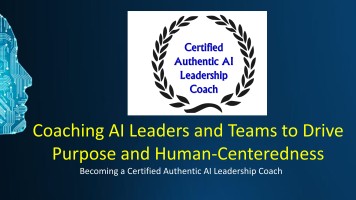Hubert Rampersad, Ph.D.
“Artificial Intelligence (AI) is transforming industries, enhancing efficiency and productivity, and pushing the possible limits. As a result, the job market is evolving, and while some jobs will become automated, new opportunities will arise. The future of work will involve humans collaborating with AI to accomplish tasks more efficiently and productively. Therefore, organizations must reskill and upskill their workforce to ensure individuals possess the necessary abilities to thrive in this AI-driven future. Eco-design thinking is essential in developing authenticity, integrity, empathy, and critical thinking skills to keep up with AI and adapt to unpredictable circumstances. This will future-proof our careers and allow us to thrive.”– Hubert Rampersad.
“AI excels at imitation but not innovation. Current AI systems like ChatGPT are trained on large datasets of human-generated text and images, allowing them to summarize existing knowledge smartly. However, unlike humans, they struggle to innovate on these ideas. This is because they lack the creativity and intuition that humans possess, allowing us to think outside the box and develop new and innovative ideas. Perhaps one day, AI systems will be able to innovate just as well as humans can.”—Hubert Rampersad.
Generative artificial intelligence (AI) and general intelligence (AGI) are transforming the world. They profoundly impact people’s lives and solve society’s most critical challenges. However, the pace of these developments is slowed by some issues, such as data access, algorithmic bias, AI ethics and transparency, and AI legal liability. AI systems sometimes draw wrong conclusions from data, confuse fact and fiction, and present a half-baked mixture as the truth. Due to these shortcomings, we don’t maximize AI benefits. Due to the power of AI and added value for humanity, this must be worked on by not only improving the algorithms and datasets but mainly working on embedding the purpose-driven & human-centered AI model and the human-centered AI governance concept that I recently proposed, building an ethical learning culture in the organization, and making AI and AGI purpose-driven and human-centered and thus transform society for the better.
Job market
According to a Massachusetts Institute of Technology study, AI-powered worker productivity could increase by as much as 4x by 2030. The study showed that workers using AI, particularly ChatGPT, experienced a remarkable 37% improvement in productivity. Experts at the AI Decoded panel emphasize that the partnership between humans and machines will lead to innovation and progress. Rather than complete automation, the future of work may involve humans collaborating with AI to accomplish tasks more efficiently. The job market will also evolve. While some jobs may be automated, new opportunities will emerge in AI development, data science, and cybersecurity.
According to the World Economic Forum, technological advancements will create more than 97 million jobs, while 85 million jobs will be displaced. A recent Goldman Sachs study found that generative AI tools could impact 300 million full-time jobs worldwide, leading to a “significant disruption” in the job market. Anu Madgavkar, a partner at the McKinsey Global Institute, suggests that human judgment needs to be applied to these technologies to avoid error and bias. It is important to note that users of ChatGPT have reported that the bot can generate misinformation, incorrectly answer coding problems, and produce errors in basic math.
In the current AI era, job security is a growing concern for many. However, certain professions will always be in demand due to their inherent human-centric nature. These jobs require a human touch that technology can’t replicate. These jobs include healthcare professionals, artists, designers, and other roles requiring creativity and empathy. These jobs will always be in demand.
AI excels at imitation but not innovation.
According to new research at the University of California, Berkeley, while Artificial Intelligence (AI) systems are often portrayed as sentient agents that could potentially surpass human intelligence, they lack the crucial human ability of innovation. AI language models like ChatGPT are trained on large datasets of human-generated text and images, allowing them to summarize existing knowledge smartly. However, unlike humans, AI systems struggle to innovate on these ideas. This is because they lack the creativity and intuition that humans possess, allowing us to think outside the box and develop new and innovative ideas. While AI systems can help generate new ideas based on existing ones, they are not yet capable of true innovation. Researchers are constantly working to improve AI systems and make them more creative and innovative. So, who knows what the future holds? Perhaps one day, AI systems will be able to innovate just as well as humans can. Read this new research article: “Artificial intelligence systems found to excel at imitation, but not innovation” (December 13, 2023).
Reskilling
The above developments underscore the importance of reskilling and the need to address talent shortages to prepare for labor market shifts. Organizations must invest in training and upskilling programs to ensure individuals have the necessary skills to thrive in the AI-driven age. In this age, people are overwhelmed with information and struggle to think deeply and reflectively. Therefore, critical thinking has become more important than ever in dealing with AI. Individuals must be able to question AI-generated results, recognize possible limitations in the underlying data, and be aware of potential biases in the algorithms. As AI becomes more sophisticated, people are concerned that it may diminish our problem-solving and critical-thinking abilities. However, rest assured that AI cannot replace human critical thinking. While text generator tools like ChatGPT can offer accurate responses, they sometimes make textual and ethical blunders. Therefore, it is essential to have critical thinking skills to detect these blunders. Please read my article “Cultivating Critical Thinking in the Age of AI. “

Sustainability
The pandemic has taught us valuable lessons, including needing a better world characterized by empathy, personal integrity, non-racialism, and environmental responsibility. This better world should prioritize sustainability in design innovation, HR, leadership, diversity and inclusion, corporate governance, and higher education. The accompanying Figure illustrates this vision.
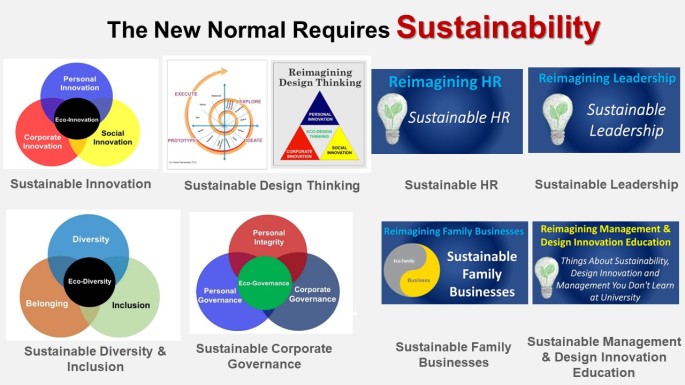
“Sustainability involves a holistic and ethical approach that aims to establish a harmonious coexistence between humans and nature for an extended period.”-– Hubert Rampersad.
Shortsighted ESG and SDG
The Environmental, Social, and Governance (ESG) framework and the Sustainable Development Goals (SDGs) were established to address economic, social, and environmental challenges by emphasizing environmental, social, and governance factors. However, short-sightedness makes these initiatives not comprehensive enough and not sustainable. Within organizations, the narrow-mindedness of leaders, project managers, and designers often leads to a lack of creativity, sustainability, and innovation. Unfortunately, many companies’ boards of directors do not truly understand the importance of genuine sustainability and sustainable innovation, resulting in missed opportunities to create a better world. 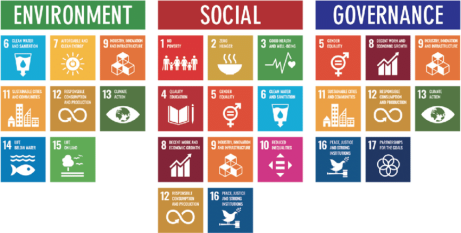
While the SDGs focus on 17 critical areas to address economic, social, and environmental challenges by 2030, the SDG framework isn’t sustainable because true sustainability begins with good people. Unfortunately, the world is full of bad people. All 17 SDGs cannot be achieved sustainably without creating good people first, and it’s shortsighted of the UN to overlook this crucial aspect.
“It is important to acknowledge that the Sustainable Development Goals (SDGs) do not include the essential SDG #18: GOOD PEOPLE. To truly address the root causes of climate change, we must move beyond simply treating its symptoms. We must focus on nurturing personal integrity, including being mindful of how our actions and behaviors impact all living beings – humans, animals, and plants. This is the foundation of empathy, crucial for effective action against climate change. Regrettably, the world is full of bad people who don’t prioritize these values, which is why so few are engaged in efforts to combat climate change”. – Hubert Rampersad. Why is this significant shortcoming not addressed by the bureaucratic United Nations?
SDG and ESG frameworks operate with the same principle: pursuing sustainability. Their ultimate goal is to achieve Purpose by positively impacting the world. However, it’s important to note that Purpose should not just be a trendy buzzword but a sustainable approach, as shown in this diagram.

Read “10 Ways to Kill Creativity, Sustainability, and Innovation”.
The era of design thinking has come to an end. Read my article “The End of Design Thinking: Cultivating a Purpose-Driven Design Culture to Fix the World”.
Eco-design thinking goes beyond the traditional design thinking. It is based on my latest book, “Eco-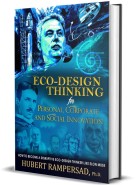 Design Thinking for Personal, Corporate, and Social Innovation.” In this excerpt, I discussed the concept of reimagining design innovation. To design a better world, we must adopt new design methods and ways of thinking. As Einstein famously stated, “We cannot solve our problems with the same thinking we used when we created them.” That’s where eco-design thinking emerges, shifting from the traditional fixed mindset to a more dynamic growth mindset. The difference between these two approaches is illustrated in the figure below.
Design Thinking for Personal, Corporate, and Social Innovation.” In this excerpt, I discussed the concept of reimagining design innovation. To design a better world, we must adopt new design methods and ways of thinking. As Einstein famously stated, “We cannot solve our problems with the same thinking we used when we created them.” That’s where eco-design thinking emerges, shifting from the traditional fixed mindset to a more dynamic growth mindset. The difference between these two approaches is illustrated in the figure below.
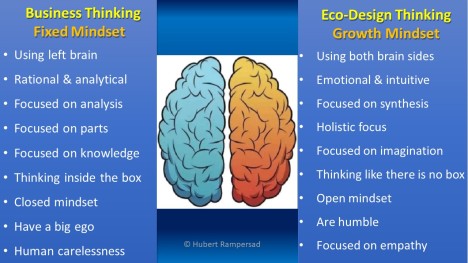
Many individuals favor their brain’s left side and ignore the right, resulting in a lack of balance. This limits their ability to approach complex design issues creatively and with authenticity. This causes bad designs.
Bad Designs
My article “Top-10 Causes of Bad Designs” highlights the negative impact of bad designs due to a lack of consideration for sustainability and generative AI. Some well-known examples of such methods include the botched vaccine rollout in America, Citibank’s loss of $500 million due to an unfriendly loan management tool, the $2 trillion F-35 project, Boeing 737 Max airplane, the T-14 Armata Russian Tank, and the Samsung.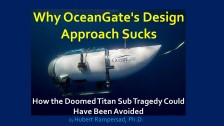 Galaxy Note 7. Please take the time to read my article “Why OceanGate’s Design Approach Sucks; How the Doomed Titan Sub Tragedy Could Have Been Avoided.” CEOs who prioritize their personal design choices over critical safety regulations, endangering human lives, can learn a valuable lesson from the tragedy of the Titan. This also applies to individuals like Elon Musk and companies like Boeing. Please look at my article “How could Elon Musk’s $3 billion Mars rocket failure have been avoided?”.
Galaxy Note 7. Please take the time to read my article “Why OceanGate’s Design Approach Sucks; How the Doomed Titan Sub Tragedy Could Have Been Avoided.” CEOs who prioritize their personal design choices over critical safety regulations, endangering human lives, can learn a valuable lesson from the tragedy of the Titan. This also applies to individuals like Elon Musk and companies like Boeing. Please look at my article “How could Elon Musk’s $3 billion Mars rocket failure have been avoided?”.
Top 10 causes of bad designs:
- INCOMPETENT DESIGNERS: Designers don’t use their right brain and left brain in a balanced way, lacking an intuitive, open, empathic, ethical, and growth mindset.
- DESIGN PROCESS HAS ENDPOINT: Design process should be a never-ending, non-linear, circular, iterative, incremental, cyclic, and concentric process that never stops.
- NON-HOLISTIC DESIGN APPROACH: Design method should prioritize cultivating a purpose-driven design culture that makes a positive impact on society.
- FOCUS ON KNOWLEDGE RATHER THAN IMAGINATION: Design method should take an inside-out approach to creativity, emphasizing the designer’s imagination.
- DESIGNERS LACK GENUINE EMPATHY AND PERSONAL INTEGRITY: The higher your personal integrity, the better your attentiveness, the better your empathic skills, the better your design. Genuine empathy starts with personal integrity.
- NON-DISRUPTIVE DESIGNERS: Design method should start with designing the designer’s life to become disruptive with a growth open mindset.
- DOES NOT FACILITATE THE USE OF GENERATIVE AI: Designers lack critical thinkings skills to use generative AI tools like Stable Diffusion and ChatGPT to create novel designs.
- BAD DESIGN LEADERS: Design leaders lack coaching skills to cultivate team learning to enhance team performance.
- DISENGAGED DESIGN TEAMS: Aligning and synchronizing the designer’s ambition with the design team’s ambition is needed to enhance designer’s engagement.
- COZY DESIGN MEETINGS AND USE OF TOOLS: Design method focuses mainly on a process-driven, analytical thinking, cozy, theatrical design process and completing related tasks in a particular order using design tools.
The figure below illustrates the top 10 reasons behind these bad designs.
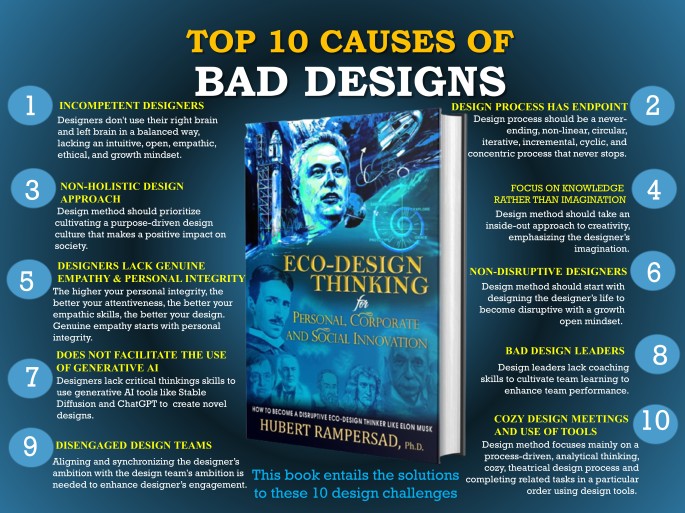
Eco-design thinking is needed to avoid bad designs. For this you need a sustainable innovation approach called eco-innovation.
Eco-Innovation
In today’s complex world, sustainable innovation is crucial. Traditional innovation approaches are inadequate because they lack a holistic approach. Instead, they are superficial, theatrical, and cozy. Such approaches do not align with my above mentioned definition of genuine sustainability, which entails a holistic and ethical system that fosters long-term coexistence between humans and nature. This is why I introduced the Eco-Innovation concept, as part of eco-design thinking. The diagram below shows how personal, corporate, and social innovation in the eco-innovation concept are interconnected. Personal innovation is linked to self-learning, corporate innovation is linked to organizational learning, and social innovation is linked to community learning.

A Novel Approach to Design for Sustainability and Generative AI
We must adopt a new design method better suited for generative AI to design a more sustainable world. This method should prioritize creating intelligent, resilient, empathetic, and honest designers. To achieve this goal, I have introduced eco-design thinking. This creative process involves empathizing with yourself, the end user, and the environment to generate innovative, imaginative, empathetic, and disruptive design ideas. The new model is depicted in the figure below and consists of four stages: Explore, Ideate, Prototype, and Execute. It is an iterative, incremental, cyclic, and concentric process of exploring, ideating, prototyping, and executing (Rampersad, 2022). AI-powered tools that generate content can be helpful in every stage of the design process. It’s starts with designing the designer’s life.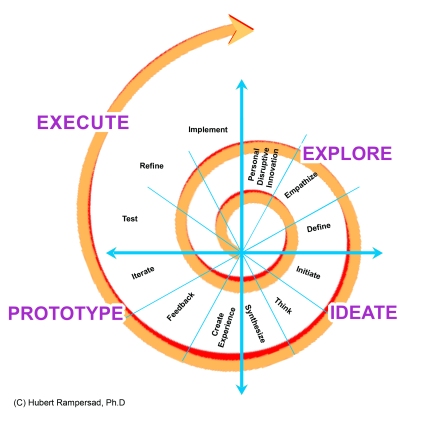 Eco-design thinking is a circular and iterative process that has no endpoint. The model consists of various stages that may form iterative loops and do not need to follow a specific sequence. Every iteration brings forth fresh insights. It is recommended that this process be repeated until the issues of the designer and end-user reach an acceptable level. Eco-design thinking is a continuous and circular process that requires testing and refining your design while empathizing with yourself, the users, and the environment. At any design stage, generative AI tools can produce the best empathic design customized to the end-user’s needs and the environment. Please read my article “How To Design a Better World”.
Eco-design thinking is a circular and iterative process that has no endpoint. The model consists of various stages that may form iterative loops and do not need to follow a specific sequence. Every iteration brings forth fresh insights. It is recommended that this process be repeated until the issues of the designer and end-user reach an acceptable level. Eco-design thinking is a continuous and circular process that requires testing and refining your design while empathizing with yourself, the users, and the environment. At any design stage, generative AI tools can produce the best empathic design customized to the end-user’s needs and the environment. Please read my article “How To Design a Better World”.
Read also “Building a Purpose-Driven Design Culture in Tech Companies”

Hubert Rampersad, Ph.D.
Complimentary Initial Consultation to Enhance Your Design Process and Boost Design Team Performance

 You may attend his Orlando-Tampa Live Events to learn more about this subject:
You may attend his Orlando-Tampa Live Events to learn more about this subject:
Building a Purpose-Driven Design Culture in Tech Companies

Purpose-Driven and Human-Centered AI
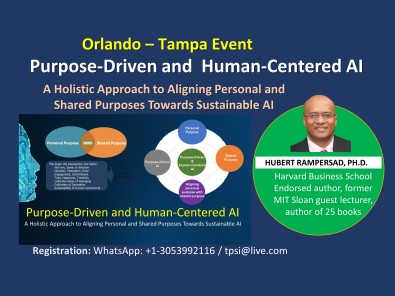
Cultivating Authenticity, Integrity, Empathy, and Critical Thinking in the Age of AI.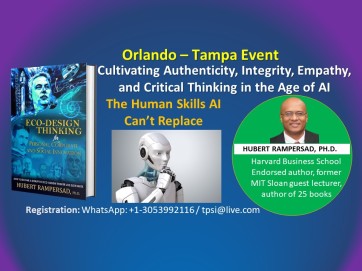
Human-Centered AI Governance.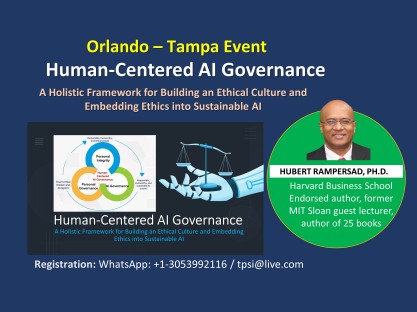
How Sustainability and Generative AI Fuel Design Innovation.
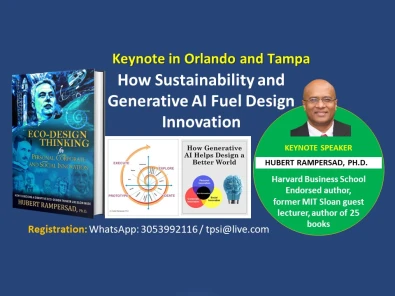
The Future of Innovation
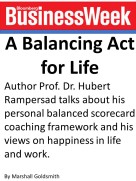


Orlando, Florida | tpsi@live.com | Phone/WhatsApp: +13053992116
About the author https://bit.ly/2CQLIfS



 You may attend his Orlando-Tampa Live Events to learn more about this subject:
You may attend his Orlando-Tampa Live Events to learn more about this subject:


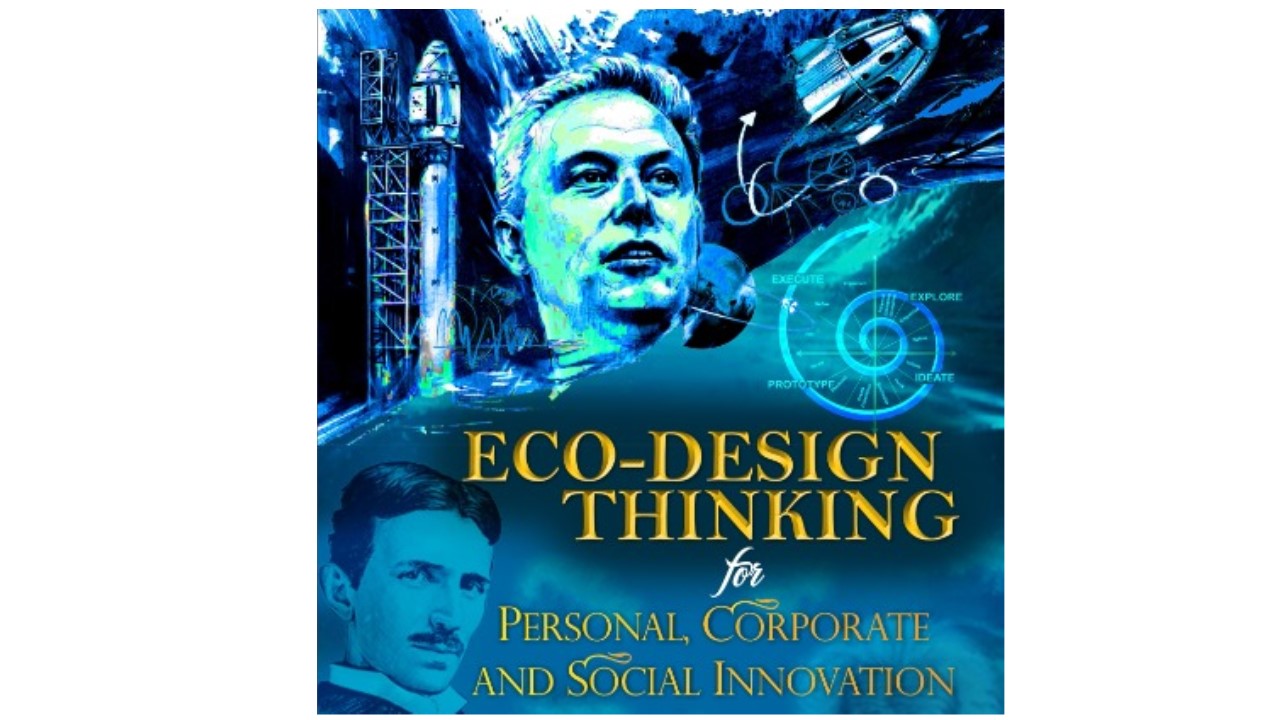





 Design Thinking for Personal, Corporate, and Social Innovation
Design Thinking for Personal, Corporate, and Social Innovation



 Eco-design thinking is a circular and iterative process that has no endpoint. The model consists of various stages that may form iterative loops and do not need to follow a specific sequence. Every iteration brings forth fresh insights. It is recommended that this process be repeated until the issues of the designer and end-user reach an acceptable level. Eco-design thinking is a continuous and circular process that requires testing and refining your design while empathizing with yourself, the users, and the environment. At any design stage, generative AI tools can produce the best empathic design customized to the end-user’s needs and the environment. Please read my article “
Eco-design thinking is a circular and iterative process that has no endpoint. The model consists of various stages that may form iterative loops and do not need to follow a specific sequence. Every iteration brings forth fresh insights. It is recommended that this process be repeated until the issues of the designer and end-user reach an acceptable level. Eco-design thinking is a continuous and circular process that requires testing and refining your design while empathizing with yourself, the users, and the environment. At any design stage, generative AI tools can produce the best empathic design customized to the end-user’s needs and the environment. Please read my article “





